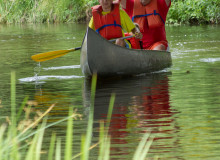Tech-Free Camps Provide a Solution
“Mom, do I like ranch dressing?” Supposedly, this was a text from a college student to her mom from a salad bar.
It’s an example of young people dependent upon technology, and it points to the use of cell phones as an extension of their own brains. That rather than doing a quick taste test, the student in the story turns to her phone (and her mom) for the answer, because, well, it has all the answers.
A New York Times article this week (“Phone-Sick at Camp” By Jill Werman Harris, June 7, 2016) quotes Christopher Thurber, a clinical psychologist who focuses on youth development and summer camp: “How we communicate has changed the nature of attachment, and it complicates the separation that kids and parents go through,” he said.
The article also quoted a study of sixth graders who spent just five days at a tech-free sleepaway camp. According to the study, these kids developed greater understanding of real-world interpersonal communication cues, including a better ability to read facial expressions, make eye contact, and interpret tone of voice and other prompts, such as posture and keeping an appropriate spatial distance with others.
Sounds to me like tech-free camps serve a significant purpose in the social and emotional development of kids today. Is there something adults can learn from this, too?
Read the full article here.




















